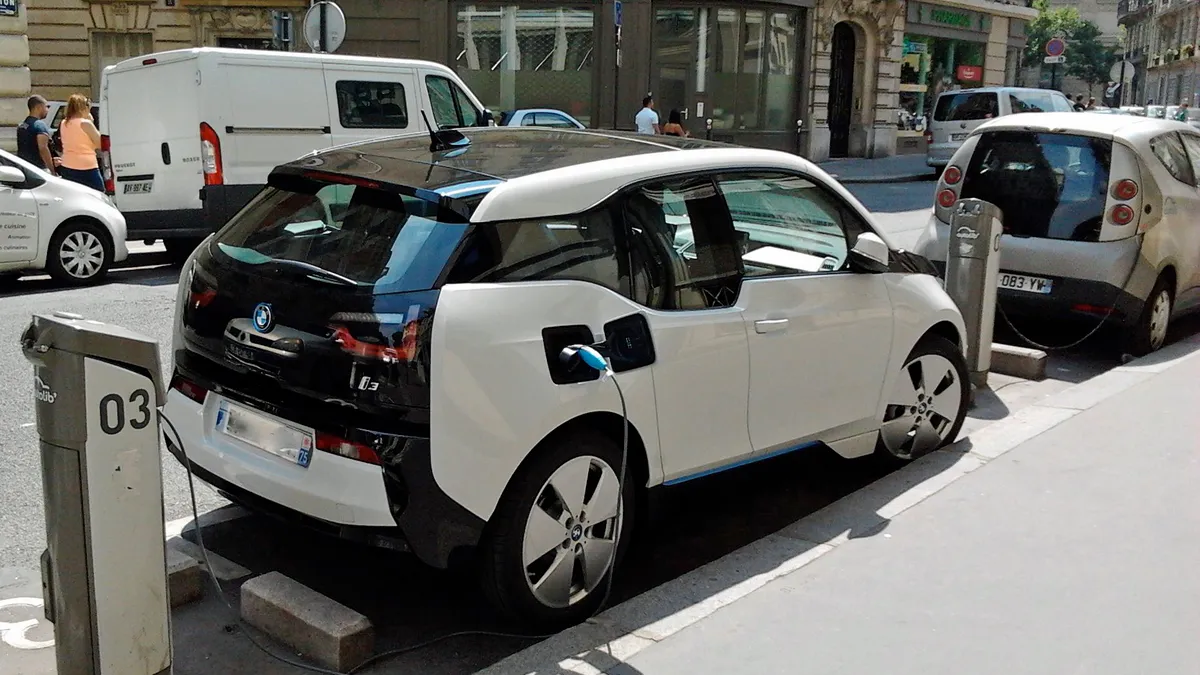Dive Brief:
- The expected increase in electric vehicle (EV) adoption will require an investment of more than $2.2 billion in charging infrastructure across the United States' 100 most populous metropolitan areas by 2025, the International Council on Clean Transportation (ICCT) said in a new report.
- The report, published on Monday, said $1.3 billion would be needed to make the necessary upgrades to home charging, while a further $940 million would go toward workplace and public charging. The report did not name a specific funding source, but pointed to utilities and other companies, as well as local, state and the federal government as options.
- Investments in charging infrastructure are critical to boost EV adoption rates in the U.S. as studies have shown that a lack of charging opportunities remains a top reason why potential buyers would not opt for such a vehicle.
Dive Insight:
Total EV sales in the United States saw an 81% year-over-year increase in 2018, with 361,307 cars sold, according to Inside EVs. Globally, consumers bought more than 2 million EVs last year, with BloombergNEF (BNEF) forecasting that this figure will grow to 10 million by 2025 and 56 million by 2040.
Reaching those predictions will require large investments across various sectors, including charging infrastructure. The Department of Energy last month reported that there are now over 20,000 EV charging stations with more than 68,800 connectors across the country. Of that total, 10,860 units, or approximately 16%, were DC fast chargers.
The ICCT report concluded that at least 100,000 public and workplace chargers will be need across the 100 analyzed metro areas to help serve the anticipated 2.6 million new EV and plug-in hybrid EVs on the roads in those areas by 2025. In an earlier report, the ICCT predicted that most locales in the U.S. will need to increase the number of charging stations by 20% each year to keep up with demand.
Monday's ICCT analysis focused on America's largest 100 metropolitan areas as they combined represent 88% of all new EV sales and 75% of overall car market.
Of the $2.2 billion figure that researchers calculated, more than $1 billion, or 50%, will go toward labor costs, with hardware (25%), materials (20%) and permits (5%) accounting for the rest.
Charging network operators EVgo and Greenlots did not respond to requests for comment.
The ICCT report also showed that the cost for public charging infrastructure decreases on a per-vehicle basis as chargers become more utilized and developers shift to more outlets per charging site. The nonprofit expects the per-vehicle cost for public chargers to decline from $480 now to $300 in 2025.
On the home front, researchers expect more than half of EV owners will continue to use their existing home charging options without any upgrades, while about 38% are expected to upgrade their home chargers at an average cost of $1,400.
"Based on these findings, charging infrastructure buildout is a strong candidate for large-scale federal funding," the report said. "Although state-level utility support is growing, city and state funding for charging is generally limited. Cost-sharing federal and local funding would help leverage limited funding to help fill the charging gap and allow local authorities to align the federal support with their own action plans."
The report's authors recommend federal grants for cities that demonstrate high EV uptake, along with comprehensive EV action plans and policies, such as a streamlined permitting process for EV chargers and supportive building codes.
The Smart Electric Power Alliance and Advanced Energy Economy did not respond to requests for comment in time for publication.













